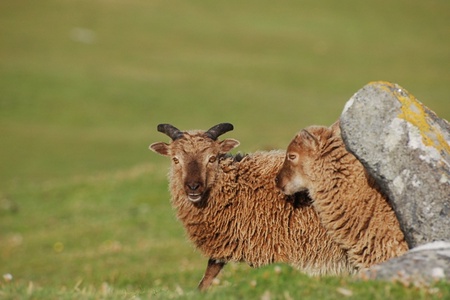Aberdeen scientists have identified the key trigger mechanism in the ‘internal clocks’ of animals which means they are prepared for the season whether snow comes in November or the sun shines in March.
The research team, led Dr Hugues Dardente and Professor David Hazlerigg at the University of Aberdeen, has pinpointed the ‘switch’ controlling seasonal hormone production, based on the changing daily cycle of light and darkness.
Their findings, published today in Current Biology, give new insight into the link between daily and seasonal timing in mammals and suggest that an ancient mechanism has remained largely unchanged during vertebrate evolution. The extent to which such mechanisms are "hard-wired" will have a major impact on how animals cope with changing seasons in a warming world.
The study, in collaboration with the universities of Manchester and Edinburgh, looked at the primitive Soay breed of sheep, which relies on strong seasonal biology to survive in the wild on the North Atlantic islands of St Kilda.
Professor David Hazlerigg, of the University of Aberdeen School of Biological Sciences, said: “We conducted a previous study in 2008 where we identified the key signal to the brain controlling seasonal behaviour and physiology.
“We found that a chemical known as thyroid stimulating hormone (TSH) acts in the brain to control the activation of seasonal breeding in sheep, and is regulated by day length.
“But we did not know how changes in the daily cycle of light and dark triggered the production of high levels of TSH in the spring and a decline in the autumn. We have now indentified that ‘switch’, linking the daily ‘circadian clock’ to the yearly seasonal clock.
"Understanding this process is vital as seasonal changes in day length are used by animals to synchronise major life-history events such as migration, moulting, and reproduction.
“It enables seasonal animals to anticipate and prepare biologically for what is going on in the outside world rather than adapting to it once it has happened, for example growing a thick coat in preparation for winter.
“Because the switch we describe is based on day length, it performs reliably, regardless of whether we have snow in November or an unseasonably warm March.”
Professor Hazlerigg said this has important implications for the adaptation of strongly seasonal animals to climate change.
“Animals with systems that are highly reliant on day length as a cue may struggle to adapt as global warming starts to affect the timing of favourable conditions for growth and breeding. For example, a warm spring might lead to birds arriving at a spring feeding area after the peak of food availability has already passed, to the detriment of their breeding success.
"By defining the molecular pathways through which day length synchronisation operates, we open the way for genetic analyses of the impact on climate change on seasonal species, and may be able to predict species vulnerability dependent on habitat and genetic makeup."


